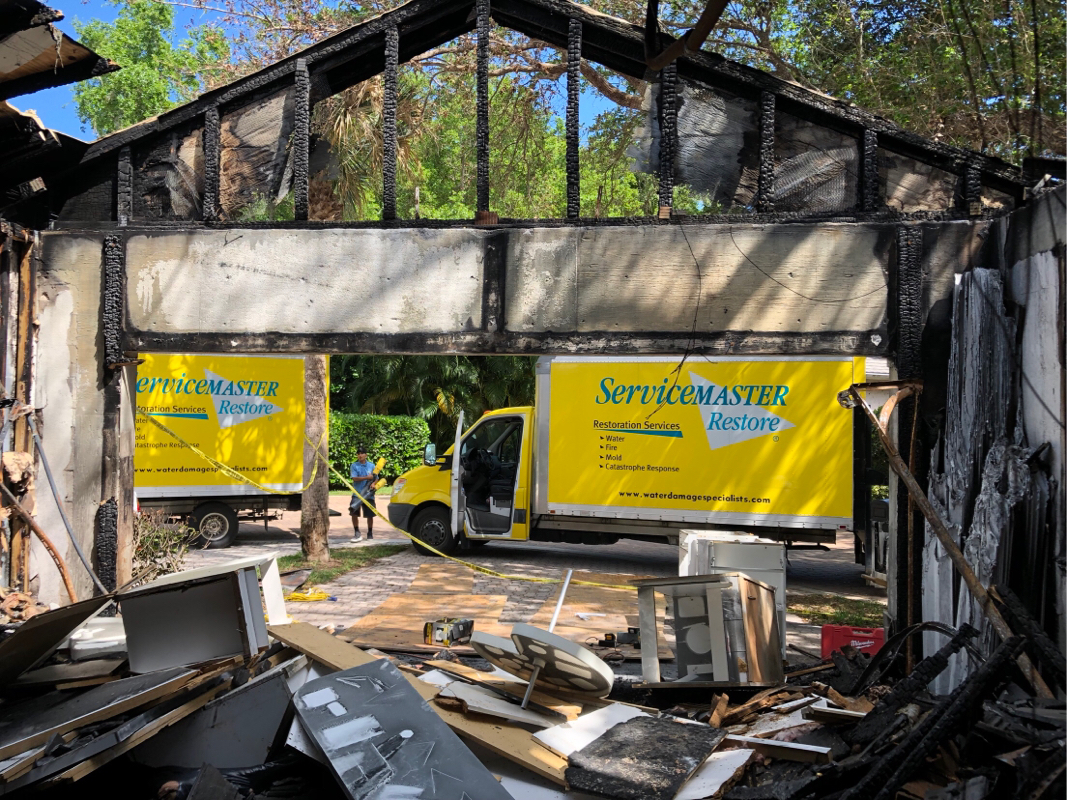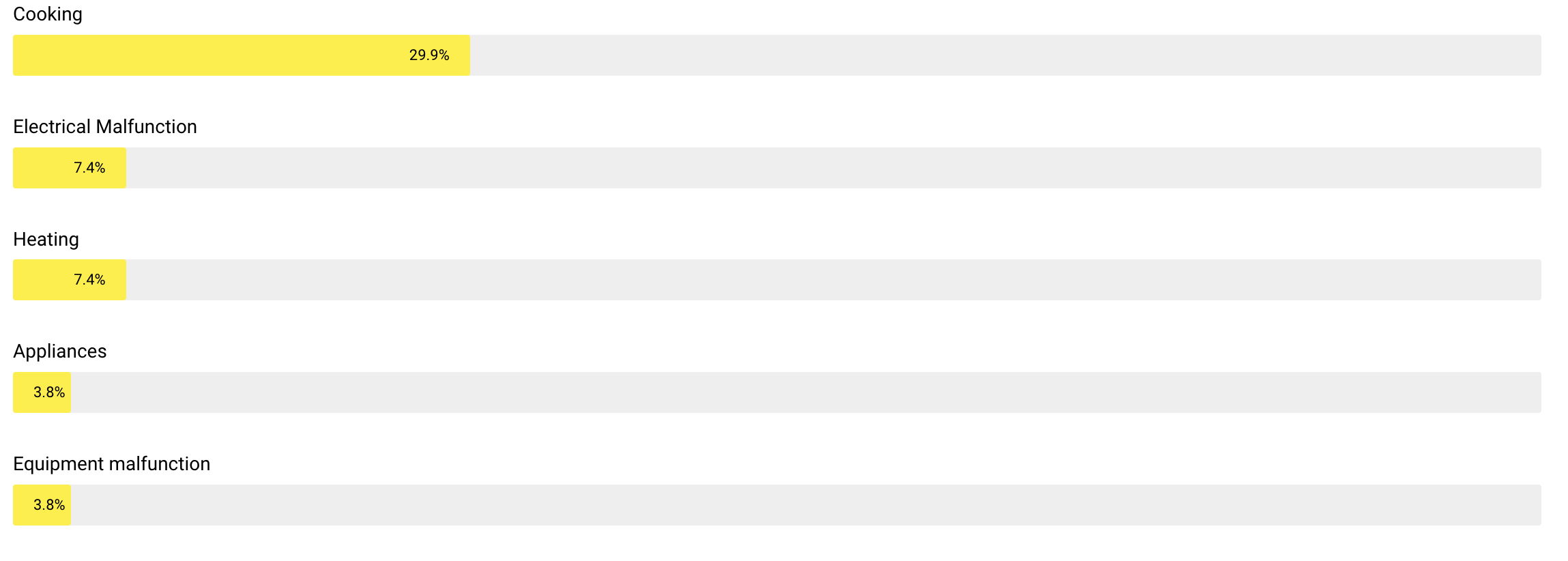All About Fire Damage: Preventing Fire Damage in Your Home or Business
October 4th, 2018 | 4 min read

Fire prevention is a year-round consideration and we want to help you prevent fires in the workplace and your residence.
With planning, preparation, and education, consumers and businesses alike can take meaningful steps to avoid the danger and destruction of commercial and residential fires. Use this information to make your home and business safer year-round!
The Stats
Figures provided by the U.S. Fire Administration.
Residential

Non-Residential

Tips for Fire Prevention
Get Rid of Clutter
It is easy to collect clutter! Whether you have a home or business, clutter is always a factor. Harboring items that have been acquired, items you have spent money for, keepsake items, or stockpiled inventory or supplies can definitely be a fire hazard. If a fire starts near an area that has a large quantity of clutter, the flames spread more quickly. Now is the time to go through your home or business and declutter. Make sure emergency exits and escape routes are not blocked by clutter, furniture, or other assets.
Don't Overload Electrical Circuits
Everyone wants to make sure their electronic device is charged. Between smartphones, tablets, televisions, computers, appliances, lighting, and other devices… electrical outlets are in demand in any home or business. Overloaded circuits cause overheating and overheating can cause a fire. When overtaxed, circuit breakers can also malfunction, which can cause a fire. Consider these tips:
- Do not connect an extension cord or power strip to another extension cord or power strip
- Don't use extension cords permanently. Use them only for temporary purposes
- Don't use worn, old, or damaged extension cords
- Don't use heat-producing appliances, such as a coffee maker or iron, on anything but an outlet
- Don't run electrical cords under doorways or carpets
Don't Put Heat-Producing Appliances or Equipment Near Fuel Sources
Different appliances and equipment produce higher amounts of heat than others. As an example, copy machines or coffee makers run hot. Make sure appliances and equipment that run hot stay away from products that will fuel a fire, such as paper. So if you have a copy machine or printer, keep it separate from the paper.
Check Smoke Alarms Once a Month
Each month, smoke alarms and smoke detectors should be checked and tested. If you have not replaced your smoke alarms or smoke detectors in the past 10 years, replace them. Smoke alarms and smoke detectors that are older than 10 years old are prone to malfunction and do not contain updated technology.
Practice Makes Perfect
Each quarter, practice fire evacuation drills. Also, make sure you plan for the worst by having a business continuity plan. Disaster restoration planning allows you to minimize financial losses, and disruptions, establish evacuation plans, and communicate during times of emergency. Click the links below to learn more:
- Residential Disaster Restoration
- Commercial Disaster Restoration ="alert.default">
Be Safe When Cooking
Never leave anything cooking unattended, even for a minute! Food burning can cause protein fires, which we cover in the next section. Protein fires can cause smoke odor damage and require specific equipment to remediate. To avoid this danger, always supervise your cooking and do not leave food cooking for long periods of time unsupervised.
Types of Fires
Most people think a fire is a fire, but did you know there are different types of fire? All fire damage produces smoke odor damage and the home or business usually also suffers water damage from putting out the fire.
- Protein Fire
Protein fires are most often caused by cooking and result from burning food that is high in protein like food or meat. If you have experienced a fire in your kitchen from burning food, the smell may not go away! Fire damage restoration of a protein fire requires very thorough cleaning to get rid of the odor and residue. Specific equipment and training is necessary to get the job done successfully. - Complex Fire
Complex fires are caused by multiple natural and synthetic items inside your home that have burned causing black smoke residue on contents and surfaces and synthetic smoke odors. Here, emergency corrosion mitigation is needed to protect at-risk surfaces.
- Natural Fire
If you experience a fire near your home or business and the smoke odor or smoke residue has penetrated the structure from the outside, you have experienced natural fire damage. Black soot requires specialized equipment to resolve.
- Appliance Fire
When microwaves or hot water heaters explode, ovens burst into flames or dryers catch fire, that’s when you know you have experienced an appliance fire. Black soot and smoke odor damage require expert knowledge, skill, and equipment to resolve.
- Electrical Fire
When electrical circuits become overloaded by too much demand, electrical fires occur. Electrical fires can also be caused by faulty, old wiring and can produce some pungent smoke odor damage. To remove the black soot and smell, we have the processes and technology to restore your home or business back to its original condition.
Why Fire Damage Repair Needs to Happen Immediately
Obvious signs such as discoloration on walls or ceilings can disappear with the replacement of the affected material. However, the smoke odor will not go away as it becomes trapped in hidden places and can continue to cause damage the longer it lingers. Air conditioner vents, spaces behind walls, or the outside walls of your home or business are all areas where ash and soot can hide and continue to cause smoke odor damage if they are not resolved immediately.
What to do when fire damage occurs
Processes and technology are the key to handling fire damage when it happens. As a trusted fire damage contractor, we will make sure fire damage and smoke odor damage are handled properly by:
- Inspecting the structural integrity of the building for safety
- Identifying the source to determine the type of fire that occurred
- Evaluating all areas that suffered water damage as a result of fire suppression efforts to identify those that may need treatment
- Remediating water damage (if any)
- Evaluating sensitive materials that may be damaged as a result of smoke and soot particles
- Removing contents from the building, including:
- Collecting immediate items you may need to operate your business remotely
- Securing removal, storage, and cleaning of sensitive files and data storage devices
- Salvaging of product stock, raw materials, commodities, and machinery
- Packing out the remaining contents for cleaning and storage
- Performing structural restoration, including:
- Removing any charred contents that may seal in smoke such as insulation and burned wood
- Evaluating carpets and floor coverings that may need to be removed
- Treating affected surfaces for smoke odors and sealing to keep any leftover odors from leaking back into the building
- Cleaning, eliminating odors, and deodorizing surfaces to pre-loss condition
- Returning items to the original location and helping to restore your normal operation.
Don't Know What To Do Next? We Do
- We're ready to restore your home or place of business following any disaster
- 24/7 our trained and well-equipped experts respond to your emergency needs
- With you as our priority, we say what we do and do what we say
With over 44 years of experience in the Treasure Coast and Palm Beaches, we're the experts you can trust for all tips and information related to restoration and reconstruction.